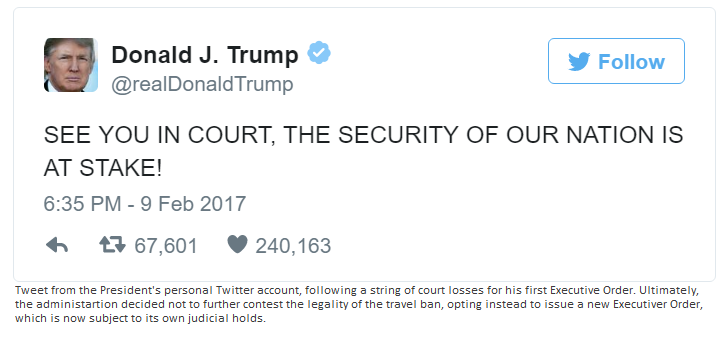Federal Judges Place Hold on Trump’s Second Travel Ban
March 19, 2017
President Trump’s first travel ban was hastily implemented and vaguely written – as an example, days after it had taken effect, it still wasn’t clear whether or not the restrictions applied to green card holders or dual nationals – so it was no great surprise when court after court found reason to halt the ban’s implementation. Eventually (and despite President Trump’s promise on Twitter to “SEE YOU IN COURT”) the administration simply stopped defending the first ban in court, with a promise that a new version was coming that would address the first order’s obvious shortcomings.

The new Executive Order, issued on March 6th, did indeed address many of those shortcomings. It clearly exempted green card holders and dual nationals who held at least 1 passport from a country not on the ban list, and it was reportedly written with input from the various government agencies that would be responsible for implementing the ban, including USCIS. Perhaps most importantly for avoiding a huge public backlash, it wasn’t designed for immediate implementation, meaning that no one would be stranded mid-trip at U.S. airports.
Nevertheless, one day before the ban was set for implementation, a federal judge in Hawaii placed a hold on the order, meaning that as of now there is still no effective travel ban in place. That order was soon joined by a second court order, from a federal judge in Maryland. To be clear, both rulings prompted a hold to be placed on the executive order (or sections of the executive order, in the case of the Maryland judge’s more narrow ruling) while the constitutionality of the order can be determined. It remains possible that the order will be upheld on final ruling, but in the interim there is no effective travel ban.
Interestingly, both judges’ rulings cited the Trump administration’s many public comments about immigration, and specifically their desire to implement an unconstitutional religious test for entry to the U.S., as a primary reason for putting a hold on the Executive Orders. That would imply that the administration may struggle to implement a ban no matter how carefully the ban itself is worded. In the meantime, the uncertainty around U.S. policy with regard to immigration from majority-Muslim countries (or by Muslims in general) is almost certainly having a dampening effect on such immigration, meaning the Trump administration may achieve their larger goal of reshaping the demographic future of the United States even without achieving a single court or legislative victory.
TAGS: Executive Order, Travel Ban, Trump
January 27, 2026
Fiscal Year 2027 H-1B Lottery The initial registration period for the fiscal year 2027 H-1B lottery has been set. Registrations will open at noon Eastern...MoreJanuary 14, 2026
ALERT: State Department To Pause Issuance of Immigrant Visas From 75 Countries On January 14th, the Department of State issued a post on social media announcing that they would “pause immigrant visa...More




